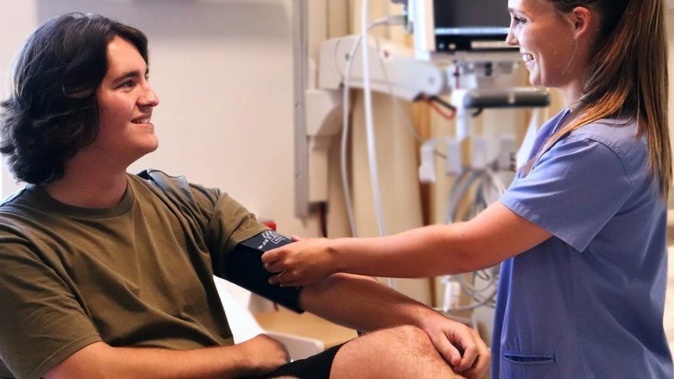
A group of New Zealanders will be the first humans to trial a new second generation covid vaccine out of China.
About 25 young people have this week started being jabbed with the ReCov vaccine as a part of a clinical study.
The trial is being run in partnership with vaccine developer Jiangsu Rec-Biotechnology in China and New Zealand Clinical Research, which has centres in Auckland and Christchurch.
NZCR is running the trial which will see 100 people vaccinated with ReCov by September.
If successful, a larger trial involving thousands of participants would likely also be carried out in New Zealand.
The vaccine will be tested on both a younger population and an older 55 plus population.

NZCR medical director Dr Chris Wynne. (Photo / Supplied)
NZCR medical director Dr Chris Wynne said they have already started administering a low dose of the vaccine to 25 younger participants.
Once their data was reviewed, the older group would be given the lower dose at the same the younger group got the higher dose. Lastly the higher dose would then be put into the older group.
"We go reasonably slowly. So we dose some people and assess the response and so far there have been no particular issues and we don't expect any, but we are extremely cautious in how we do this according to the protocol."
Wynne said New Zealand was seen as a good place to run a clinical trial because it had a good health system, had a compliant population and could produce high quality research data for the pharmaceutical industry. It was also considered low risk as there was no Covid in the community and there was still a large population who had not been immunised.
He said there was some incredible research coming out of China and the ReCov vaccine and could potentially be better than the current Pfizer vaccine favoured by the NZ Government.
Unlike the Pfizer vaccine, ReCov immunises against two parts of the immune system.
"So theoretically if there's a mutation in one part of the virus some vaccines will no longer work - the virus may escape the vaccine, but if you've immunised against its two parts you have a much greater chance that the virus will not escape from the immune system."
While the Pfizer vaccine was wonderful and provided immunity to 90 per cent of those who were vaccinated, he said there was a need to be prepared for coronavirus long term and develop more safe and effective vaccines.
Once the current trial showed that it could generate immunity and the vaccine was safe, a much larger second trial would be carried out and it was possible the expanded study could be carried out in New Zealand.
"I would expect that from the animal data, this is likely to be a successful vaccine. So here we will have 100 people who will be successfully immunised."
Other Chinese vaccine makers have conducted human trials in Austria, but this is the first time a Chinese vaccine had been tested in New Zealand.
An American and Asian based company were also in talks with NZCR about running their Covid vaccine studies.
However, the trials need to be carried out swiftly while the majority of New Zealanders still had not had the Pfizer vaccine, Wynne said.
NZCR is still recruiting participants for the ReCov study and offers just over $3000 in compensation. A large number of participants tended to be students or younger workers.
ReCov has been assessed by a panel of international experts and reviewed by both the New Zealand Health and Disability Ethics Committee and MedSafe.
"I wouldn't do a study that was not in my opinion safe enough for my kids to go in," Wynne said. "There's no higher bar than that."
Take your Radio, Podcasts and Music with you









